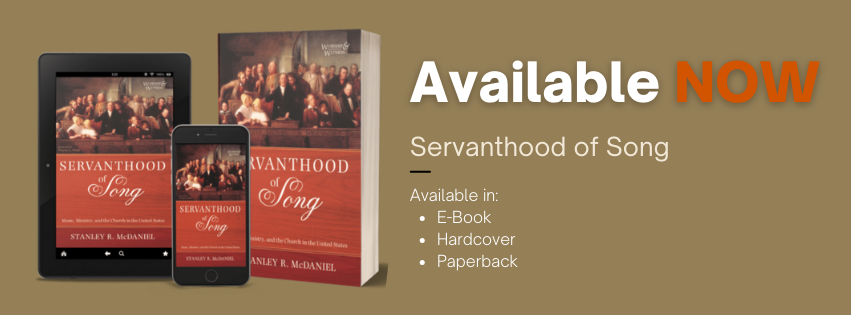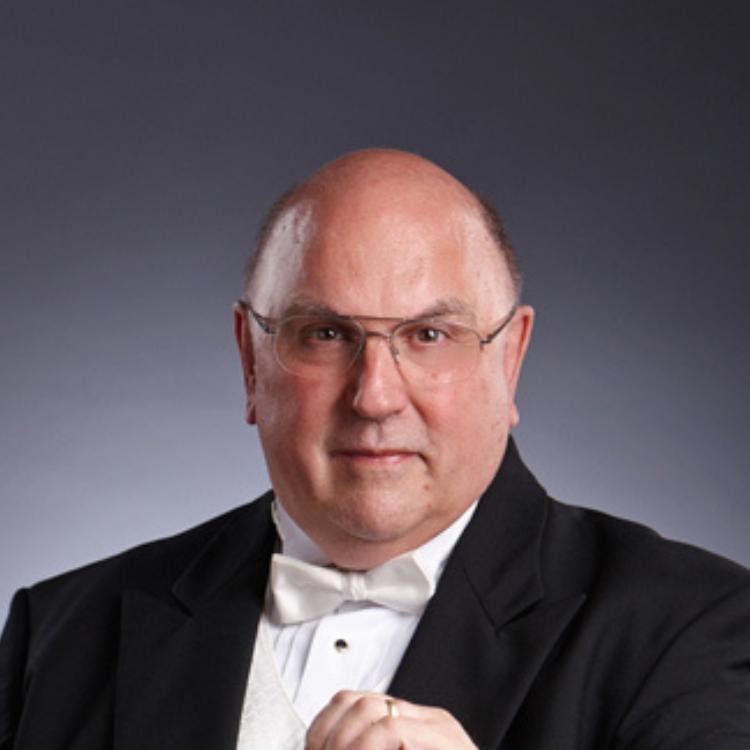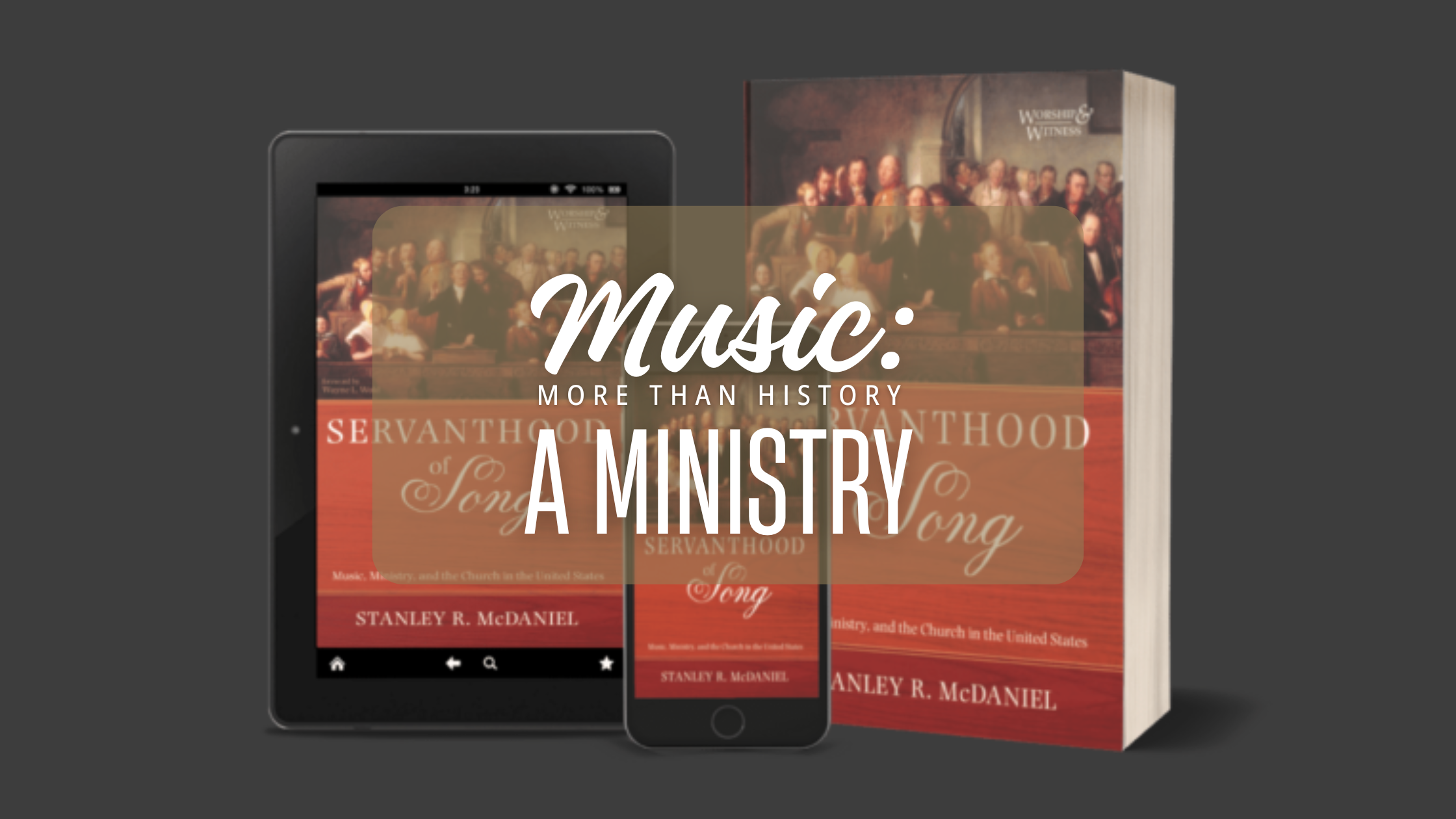Your cart is currently empty!

Dear Church Music Friends and Colleagues!
I am thrilled to announce that my book, Servanthood of Song: Music, Ministry, and the Church in the United States, will be available for purchase as of June 1, 2024. For those wanting to be first in line to get a copy, I will go over purchase instructions later in this letter. But first, I want to tell you a bit about how Servanthood of Song came to be and the themes contained within its pages.
I took my first job as a church musician in 1967 while still in college. Since then, I have served churches in Virginia, Ohio, North Carolina, Alabama, California, and Washington State. I finally retired from music ministry in 2015, but my work as a choral conductor continues. During my half century of church work, I witnessed many changes, but the most vexing of all I became aware of in the late 1980s. It was the beginning of what would become known as the “Worship Wars” – the battle to achieve dominance between proponents of traditional worship music (i.e. classical organ music, choral music, and hymnody) and those supporting “Contemporary Christian Music.” As we know now, the polarization within the church has only expanded and accelerated to become a nationwide phenomena. Meanwhile, church membership across both camps has declined substantially.
While disturbing, the divisions over music in the church are nothing new. Our American church music history is peppered with descension. Battles between those with a Eurocentric classically-oriented mindset versus those with populist musical preferences have been with us since the colonial era. I have always been keenly interested in the history of American church music and have been troubled by how little people in general know about it. From the time when I wrote my dissertation in the 1980s, I knew I wanted to write a book on a related subject. The divisions I saw the church experiencing crystallized for me the sort of book I needed to write: A history focused of the theological and social currents affecting the America’s church music over the generations – Protestant, Roman Catholic, Pentecostal, and non-denominational. What could such a history tell us about where we are now and what is needed to move forward?
Servanthood of Song is that history. Its 22 chapters outline many of the controversies roiling American church music from the earliest days.
- It discusses the “Regular Singing” controversy that shook the church in colonial times.
- You will learn of the rivalry between evangelicals leading camp meetings on the frontier and a burgeoning “better music movement” which was taking place in New York and New England.
- The book highlights the conflict in the young Protestant Episcopal denomination over whether reforms inspired by the Oxford Movement in England would lead to more authentic worship or be a much-feared encroachment of Roman Catholicism.
- Along the way, Servanthood of Song throws light on the American church’s regrettable histories of anti-Catholicism, racial, ethnic, and gender bias.
- The remarkable history of the African American Spiritual from its origins in slavery to the heroic singing of jubilee choirs which brought this music to world attention despite efforts to stifle it by the prevailing prejudices of the time is a significant focus.
- America in wartime is a subject rarely discussed in church music histories, and yet music experienced in times of conflict would repeatedly influence the music used in worship by generations following those conflicts. The Civil War is a prime example. The First and Second World Wars are also discussed.
- Likewise, the current blending of popular and sacred music styles did not arise out of the blue in the 1960s, but can be seen appearing in the years after the Civil War, and helped along by the rise first of radio and then of recordings and television.
As a long time church musician, I believe passionately that music is a ministry and that church musicians, whether titled as such or not, “minister” to the communities they serve. Their work should be comprised of equal parts professional musician, teacher, spiritual counselor, liturgical scholar, part-time theologian, and “worship pastor”. It is a huge assignment. While becoming all that entails is a goal one may never reach, church musicians should make it their life’s work to aspire to it. It is a definition I believe is borne out of the work of generations of church musicians before us.
Much of the division roiling the modern church is a confusion over priorities. Music is not and should never be why we worship. That being said, music is this incredibly powerful vehicle for the Holy Spirit to change lives. It’s power can also be mis-directed, drawing people to real evils such as shallow materialism and idolatry. Such a powerful tool for good or ill must be used with care, intelligence, and caution – clearly a ministerial role.
A second source of division, I believe, is that we often lose sight of the importance of “community.” Just as with the pulpit ministry, there is ideally a pastoral aspect to music ministry. The most effective church musicians know and embrace the community they serve, placing a high priority on achieving authentic and fully engaged worship and, through the moving of the Holy Spirit, to bring that community closer to Christ. Focusing on fully engaged congregational singing will be critical. As Karl Barth wrote, ““the community which does not sing is not the community.”
More than a history but a plea for music as a ministry – that is the message of Servanthood of Song!
To learn more about Servanthood of Song, go today to www.stan-mcdaniel.com/book. Beginning June 1, 2024 there will be a link to order your copy directly from Wipf & Stock/Cascade Books at a discount. The Wipf website will also provide links to Amazon and Barnes & Noble. Again, a digital version of Servanthood of Song should be available by mid- to late-June.

AUTHOR
Stan McDaniel
©2023 Stanley R. McDaniel, All Rights Reserved.
Copying or re-publication is expressly prohibited without direct permission of the author.


Leave a Reply